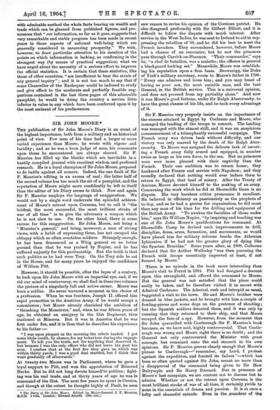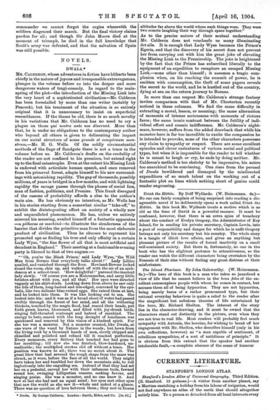However, it should be possible, after the lapse of a
century, to look upon Sir John Moore with an impartial eye, and, if we rid our mind of controversy, we shall find in these two volumes the picture of a singularly full and active career. Moore was born a soldier. He never wavered a moment in the choice of a profession. When he was fourteen, Joseph II. offered him rapid promotion in the Austrian Army, if be would accept a commission ; but Moore already cherished the ambition of "thrashing the Monsieurs," and, when he was fifteen years of age, he obtained an ensigncy in the 51st Regiment, then stationed at Minorca. But it was in America that he was first under fire, and it is thus that he describes his experience to his father :— " I was upon pioquet on the morning the rebels landed. I got some little credit, by chance, for my behaviour during the engage- ment. To tell you the truth, not for anything that deserved it, but because I was the only officer who did not leave his post too soon. I confess that at the first fire they gave us, which was within thirty yards, I was a good deal startled, but I think this wont gradually off afterwarda:
At twenty-two Moore was in Parliament, where he gave a loyal support to Pitt, and won the approbation of Edmund Burke. But he did not long devote himself to politics; fight- ing was his real trade, and at thirty years of age he was in command of the 31st. The next few years he spent in Corsica, and though at the outset he thought highly of Paoli, he soon
• The Diary of Sir John MOO.. Edited by Major-General J. F. Idaurioe, /LOX. 2 vols. London Edward Arnold. DO.. not.] • There is no episode in the book more interesting than Moore's visit to Ferrol in 1804. Pitt had designed a descent upon this stronghold, and offered the command to Moore. But the general was not satisfied that the place could easily be taken, and he therefore visited it in secret with Admiral Cochrane. The Admiral, rash and intrepid as usual, suggested a visit to the town. He and Moores brother were dressed in blue jackets, and he brought with him a couple of fowling-pieces and some dogs on the pretence of shooting; but the Spanish soldiers detected them, and it was only by cunning that they returned to their ship, and that Moore escaped the fate of a spy. However, from the moment that Sir John quarrelled with Castlereagh Sir F. Maurice's book becomes, as we have said, highly controversial. That Castle- reagh was wrong and Moore right there is no doubt ; and the General not only controverted the Minister with great courage, but remained unto the end staunch in his own opinions. Sir F. Maurice proves clearly enough that Moore's phrase to Castlereagh—" remember, my Lard, I protest against the expedition, and foretell its failure "—which has been so often quoted against Sir John, meant no more than a disapproval of the command being given to Sir Hew Dalrymple and Sir Harry Burrard. But in presence of Moore's last campaign, we are content not to diocese but to admire. Whether or not the retreat upon Oorunna is the most brilliant stroke of war of all time, it certainly yields to none in the essentials of drama and passion. It is at once a lofty and shameful episode. Even in the grandeur of the
NO DWALA.*







































 Previous page
Previous page